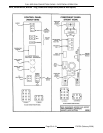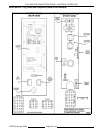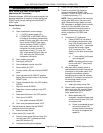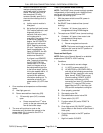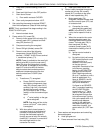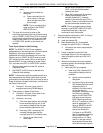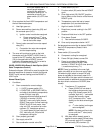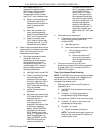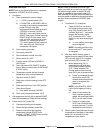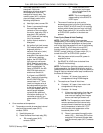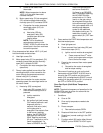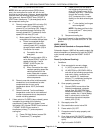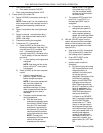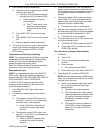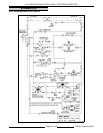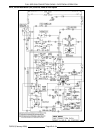
FULL SIZE GAS CONVECTION OVENS - ELECTRICAL OPERATION
F32700 (February 2006)Page 41 of 64
Roast and Hold Cycle
NOTE: Refer to the Owner's Manual for a detailed
explanation of ROAST & HOLD cooking.
1. Conditions.
A. Oven connected to correct voltage.
1) L1 (HOT) to power switch (S1).
2) L2 (NEUTRAL or SECOND LINE) to
one side of the following components:
power ON light, heat light,
temperature control board terminal 9
(120VAC) or terminal 10 (208-
240VAC), oven cavity lights, buzzer,
ROAST timer motor (normal cooking),
ROAST & HOLD timer motor, heat
relay coil (R3), convection fan motor
common (C), transformer primary
(T1), motor speed (Hi/Low) relay coil
(R1), hold relay coil (R2) and the
component cooling fan.
B. Oven properly grounded.
C. Gas supply valve ON.
D. Gas combination control valve ON.
E. Power switch (S1) OFF.
F. Function switch (S3) set to ROAST &
HOLD cycle.
G. Oven light switch (S2) ON/OFF (position
has no affect on the function of the ROAST
& HOLD cycle).
H. Temperature control dial set to lowest
temperature (fully counterclockwise).
I. High limit switch CLOSED.
J. Roast timer (normal cooking) in the OFF
position.
K. Roast and Hold timer in the OFF position.
L. Oven doors Closed.
1) Door switch contacts CLOSED.
M. Oven cavity temperature below 140°F.
2. Set temperature control dial to desired ROAST
then Hold temperature (Roast & Hold cooking).
3. Power switch (S1) turned ON.
A. Component cooling fan energized.
B. Power ON light (Amber) comes ON.
C. Power to one side of the following
components: Normal ROAST timer
terminal 1, ROAST & HOLD timer terminal
1, transformer primary (T1).
NOTE: Power is available to the oven light
switch (wire #20) to turn the oven cavity lights
ON when the light switch is turned ON; and
power is available to the normally open N.O.
side (wire #28) of the door switch contacts and
connects power to additional components when
the door switch contacts are CLOSED (door
closed).
1) Transformer (T1) energized.
a. Power (24VAC) to one side of
the following components: heat
relay (R3) normally open (N.O.)
contacts, high limit --- connected
through the normally closed
(N.C.) contacts to the 1
st
valve
(safety) on the dual solenoid gas
valve.
a) 1
st
valve (safety) on the gas
valve energized.
NOTE: Gas does not flow to the
burner until the 2
nd
valve (main)
is energized.
2) With door switch closed, power is
applied to motor speed (Hi/Low) relay
(R1) normally open (N.O.) contacts
and hold relay (R2) common (C).
a. Motor speed relay (R1) is
energized through hold relay
(R2) normally closed contacts
(N.C.). Relay contacts (R1)
change state and the normally
open (N.O.) set of contacts close.
a) Power is connected through
the function switch (S3)
contacts and convection fan
motor is energized (fan
speed low).
NOTE: In the ROAST & HOLD
cycle, the fan speed is fixed at
low.
b) When the convection fan
motor reaches operating
speed, the centrifugal switch
(N.O.) on the motor closes.
c) Power to normally open
(N.O.) side of internal relay
contacts (terminal 7) on the
temperature control board.
3) Power is also connected back through
a second set of contacts on the power
switch (S1) to terminal 8 on the
temperature control board.



